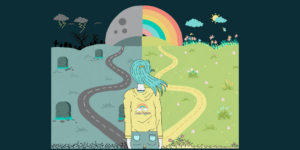
What is Creativity? How can we harness this superpower?
Creativity isn’t just for the artists and musicians! What would our classrooms look like if each student believed they were creative? What tools do you need to feel empowered to design creative, provocative, interesting, and engaging course pedagogy? A recent study conducted by IBM interviewed over 1500 CEOs from businesses around the world. Creativity was named the number one most important quality future leaders need to be successful.
These sessions are facilitated by Pete Ophoven – Masters in Creativity and Innovation from Drexel University’s School of Education Department, founder of Everyday Creativity, and full-time faculty in the Institute for Business and Information Technology. Over the sessions, participants will explore a definition of creativity, a tool for assessing creativity, and ideas for intentionally integrating creativity in their courses.
Encouraging creative expression in the classroom can open the doors for culturally responsive teaching practices in which we engage with students exactly where they are and where they come from.
Tuesday, July 26
9:30-10:30 a.m.– What is Creativity?
We will explore the history of creativity and current research including debunking several myths that creativity is only for the creative types. Will explore 11 factors of creativity originally developed by Dr. E Paul Torrance – including Divergent Thinking, Convergent Thinking, Flexibility, Fluency, and several other ways to operationalize creativity. We will discuss these factors within the framework of enhancing and improving our own creativity as teachers as well as seeking methods to introduce creativity into our teaching pedagogy.
10:50-11:25 a.m.– Taking a Creativity Assessment
The participants will continue to explore creativity within the context of The RDCA (Reisman Diagnostic Creative Assessment) a proven and free tool that allows anyone to get to know their own strengths and gifts. After reviewing the 11 factors of creativity, we will discuss this tool, the authors, its history, and its purpose. We will take the RDCA together and reflect on its findings, possible uses in our own classrooms as well as its limitations.
11:30 a.m.-12:30 p.m. – Course Transformation – applying creativity in the classroom
Looking for ways or mechanisms to transform your teaching pedagogy to improve the transfer of learning? Small teaching and simple approaches that do not require a complete overhaul of a class, rather simple and practical approaches that may make profound impacts for students’ engagement, interest and sparking their curiosity? In this last hour we apply what we have learned and introduce several creativity methods to enhance your class / course designs.
Thursday, July 28
Applying creative methods to classroom design
Looking for an opportunity to make changes to your course syllabus, assessments, discussions, or mechanisms to increase engagement and transfer of learning? Maybe you have been teaching a class for several quarters or many years and have made little changes. Where would you begin and how would you go about creating an interesting change that still maintains the integrity of the course outcomes? In the second session, participants will work together and apply methods of creativity to transform their course design. Participants are expected to have participated in Day 1 and are encouraged to bring course design that they will be workshopping with other participants.
9:30-10:30am – Introductions / Review Creativity Tools and Strategies
In the first hour we will partner together and break into groups to begin brainstorming methods to enhance creative strategies for our course design (divergent thinking). Creativity has many avenues – leveraging the RDCA and 11 factors of creativity we can specifically target ways to enhance our courses to create engaging and provocative classes.
10:50am-11:25am – Apply methods to course design
Here we begin to apply methods and work together to evaluate and hone the ideas we created in the first hour (convergent thinking). Some of us are better at coming up with novel ideas, while others are better at evaluating content and determining successful implementation strategies. Coming together in groups and sharing our ideas helps us to apply our several gifts to create better strategies to transfer learning. There is a saying in the creativity and problem-solving world, “if you want to attempt to fail, you can try and do it alone.”
11:30am-12:30pm – Workshop Debrief – sharing our ideas
In the final hour we will come back together as a group and debrief our process and thinking strategies. We will share what we have created and open the discussion for feedback. Let’s spark our genius and create something new and original and useful in our classroom. Taking a bit of time and creative effort it is amazing what we can do together.
Tuesday and Thursday, July 26 and 28, 9:30 a.m. -12:30 p.m.
Hyflex model: Come to D104H or Remote in
8 PD Hours | $150 stipend Register to save your seat!
For more information, please contact Pete Ophoven, (iBIT).
Last Updated July 28, 2022
